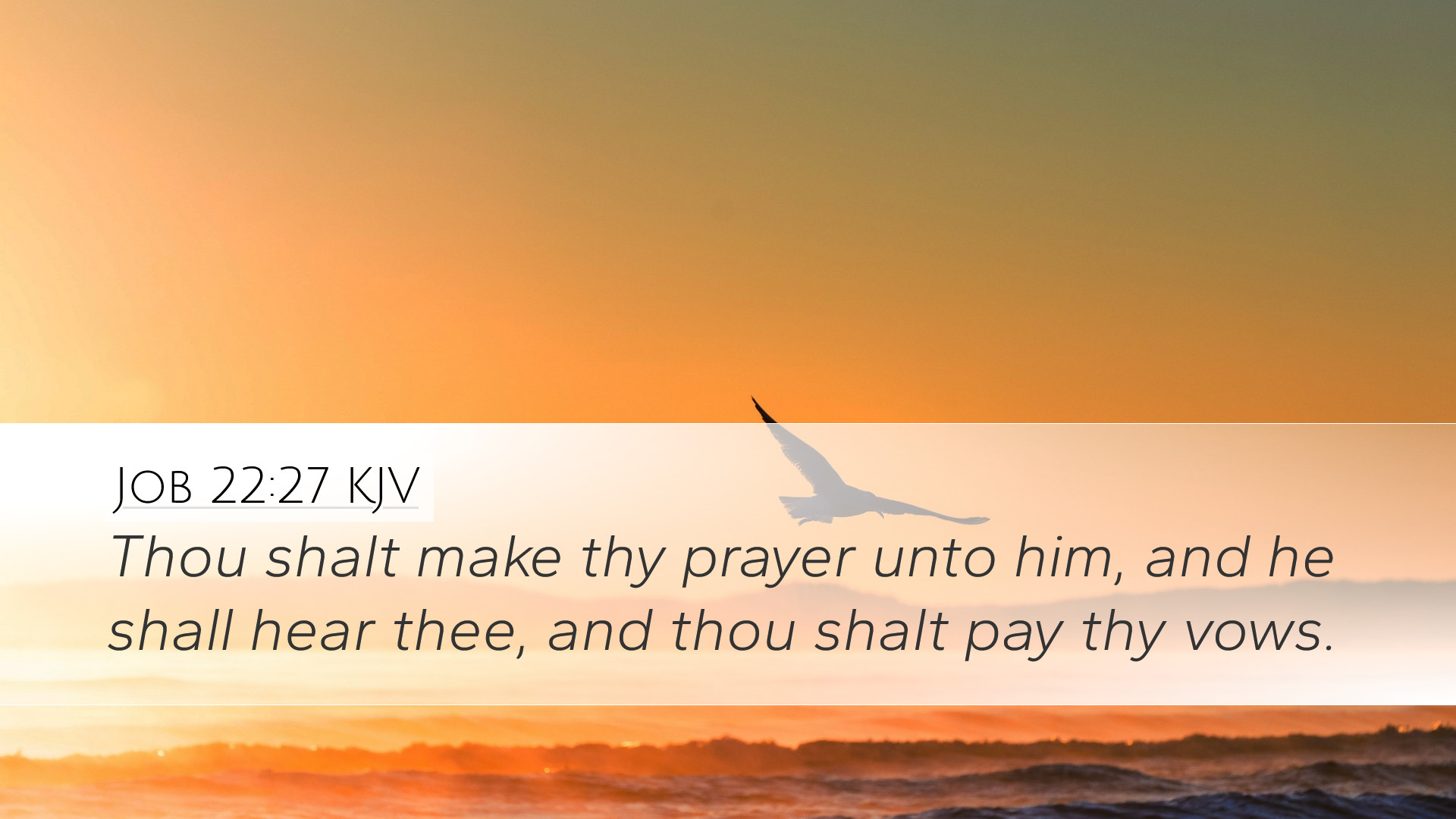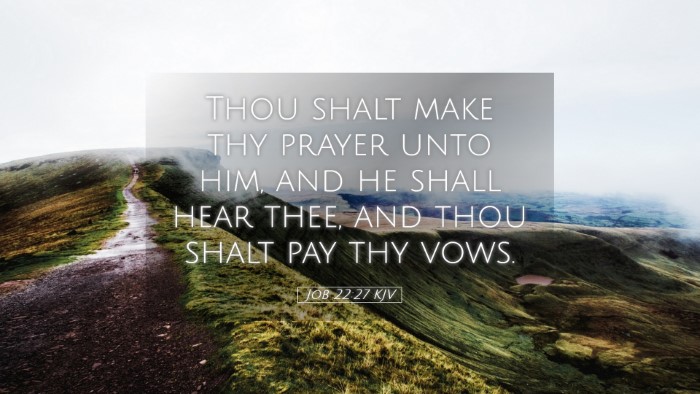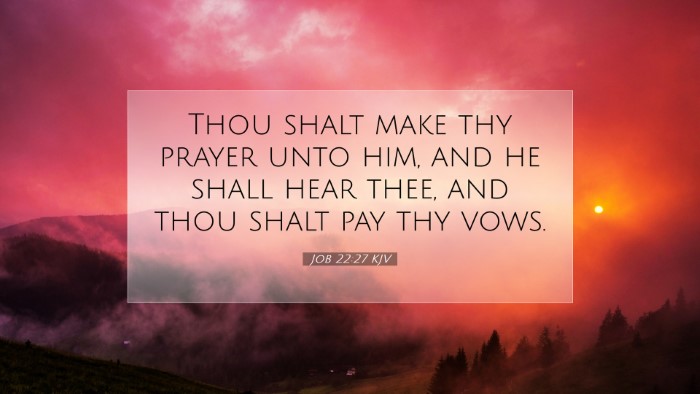Old Testament
Genesis Exodus Leviticus Numbers Deuteronomy Joshua Judges Ruth 1 Samuel 2 Samuel 1 Kings 2 Kings 1 Chronicles 2 Chronicles Ezra Nehemiah Esther Job Psalms Proverbs Ecclesiastes Song of Solomon Isaiah Jeremiah Lamentations Ezekiel Daniel Hosea Joel Amos Obadiah Jonah Micah Nahum Habakkuk Zephaniah Haggai Zechariah MalachiJob 22:27
Job 22:27 KJV
Thou shalt make thy prayer unto him, and he shall hear thee, and thou shalt pay thy vows.
Job 22:27 Bible Commentary
Commentary on Job 22:27
Job 22:27 states: "You will make your prayer to him, and he will hear you, and you will pay your vows." This verse arises amidst the discourse of Eliphaz, who is seeking to admonish Job. Through this verse, various insights can be gleaned from public domain commentaries.
Contextual Background
In the context of Job, the dialogues are essential to understanding the theological implications surrounding human suffering, righteousness, and divine justice. Eliphaz, one of Job's friends, represents a traditional view of retributive justice, suggesting that suffering is a direct consequence of sin. This perspective significantly frames his reasoning in Job 22.
Eliphaz's Argument
Eliphaz argues that if Job repents, he will undoubtedly be restored and his prayers will be answered. His speech serves as an exhibit of human reasoning that presumes a direct correlation between righteousness and divine favor. Matthew Henry reflects that while Eliphaz’s words hold some truth, they lack the grace of understanding the complexity of Job's situation.
Spiritual Insights
Eliphaz's counsel can be divided into significant spiritual insights:
-
The Encouragement to Pray:
The first notable insight from this verse is the emphasis on prayer. Eliphaz suggests that prayer is a means by which believers engage with God. Albert Barnes comments on the necessity and power of prayer in seeking divine intervention and favor.
-
Divine Response:
Eliphaz assures Job that "He will hear you." This declaration affirms the belief in a responsive God who is not distant but engaged. Adam Clarke elaborates on the assurance that God, being omnipotent and omniscient, possesses both the ability and will to hear prayers.
-
Vows and Commitments:
To "pay your vows" reflects the biblical concept of fulfilling one’s commitments to God. Matthew Henry indicates that the practice of making vows in prayer denotes a serious intention to follow through with spiritual obligations. This ties back to the covenant relationship between God and His people.
Theological Implications
This verse reveals deeper theological implications concerning God's sovereignty and human agency in the act of prayer.
God's Sovereignty
Eliphaz’s assurance, though based on a flawed understanding of Job’s predicament, points towards the sovereignty of God in answering prayer. Scholars often discuss how God’s will is intrinsically tied to the prayers of His people. Barnes elucidates that prayer does not change God's will but aligns the believer’s heart with divine purpose.
Human Responsibility
The act of making vows reflects human responsibility in the relationship with God. Clarke mentions that vows symbolize commitment and demonstrate faith, which is essential in the believer's life. It is a reminder that prayer should be coupled with a life committed to God’s commands.
Practical Applications
Beyond theological discourse, practical applications can be drawn from Job 22:27, which are applicable for pastors, students, and all believers.
-
Encouragement in Prayer:
Despite circumstances, this verse provides encouragement for continual prayer. The assurance of being heard offers hope. Pastors can encourage congregants to maintain a fervent prayer life, trusting in God's attentiveness.
-
Commitment to Spiritual Obligations:
In the context of prayer, there is a call to commitment. Believers are encouraged to reflect on their spiritual vows and the seriousness of fulfilling them as an act of worship. This can foster a deeper relationship with God.
-
Understanding Divine Justice:
This verse prompts discussions about divine justice and mercy. It is essential for students and theologians to critically engage with the concepts of suffering and God’s response. Job's story is a profound reflection on the trials of faith and the nature of God’s grace.
Conclusion
Job 22:27 serves as a profound reminder of prayer, accountability, and the expectation of divine response. The insights drawn from public domain commentaries illuminate the multifaceted nature of this scripture, meriting deep reflection and application in Christian life. As believers navigate the complexities of their faith, this verse stands as a beacon, reiterating the importance of communication with God, the fulfillment of vows, and the enduring hope woven throughout scripture.


